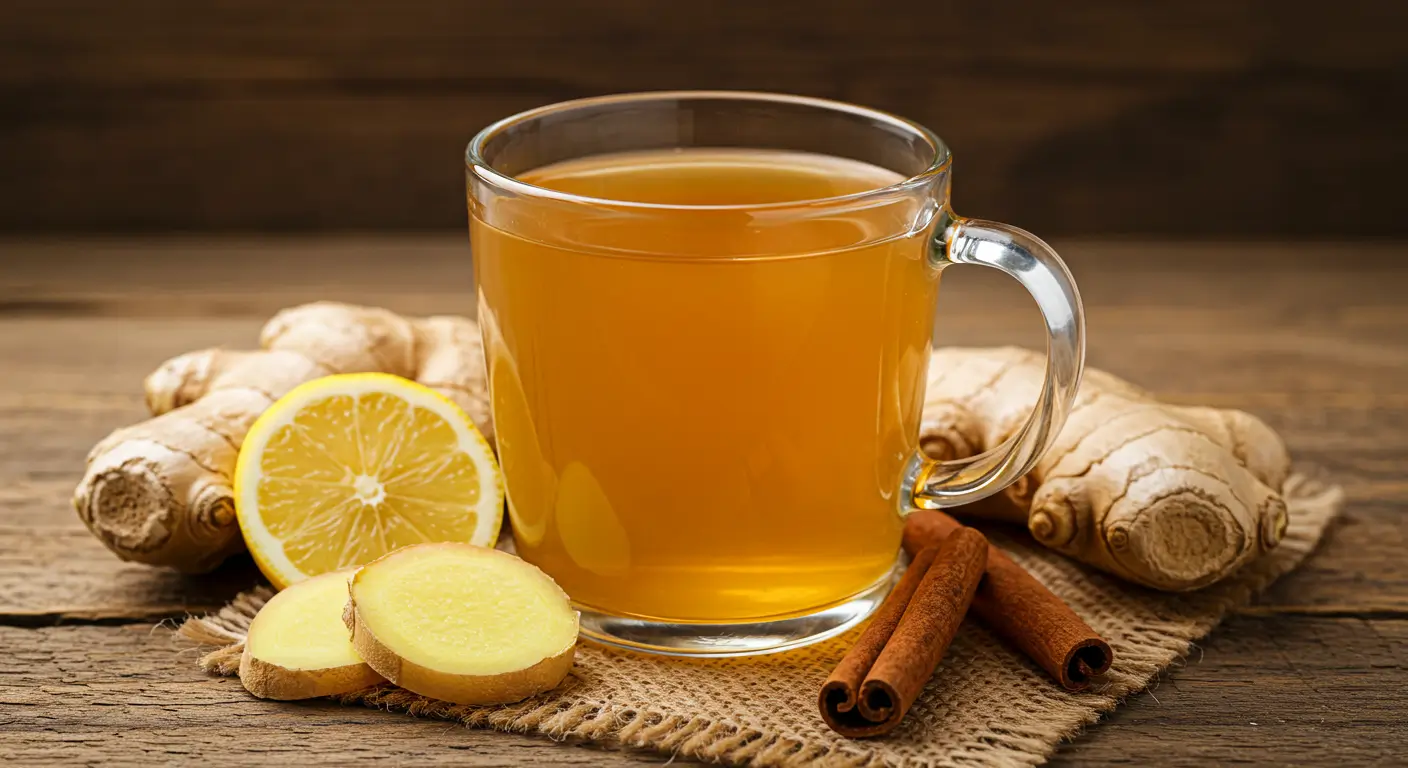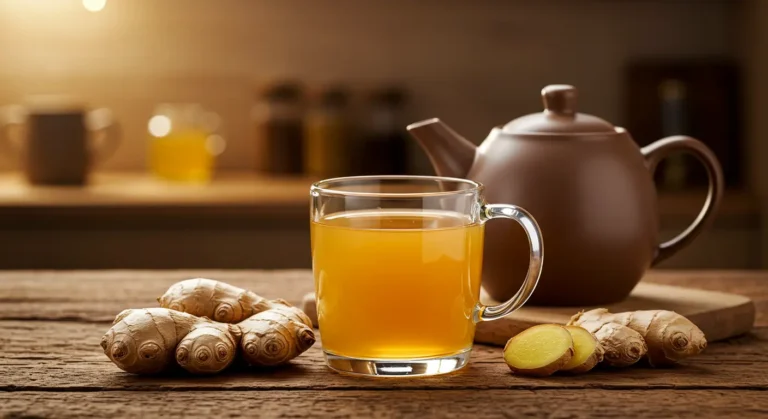How to Make Honey Ginger Tea for Better Digestion
How many digestive remedies in your medicine cabinet actually taste delicious while offering genuine relief? While pharmaceutical options often come with side effects, honey ginger tea delivers natural digestive support through compounds that have been validated by both traditional wisdom and contemporary research. This warming, aromatic honey ginger tea combines the anti-inflammatory properties of ginger with the soothing, antibacterial qualities of raw honey to create a beverage that addresses digestive discomfort at its source rather than merely masking symptoms. Whether you’re dealing with occasional indigestion, bloating after meals, or simply seeking a comforting drink that supports your digestive health, this honey ginger tea recipe offers a simple yet effective solution.
Table of Contents
Ingredients List
For a perfect cup of honey ginger tea that balances therapeutic benefits with delightful flavor, gather these ingredients:
- 2-inch piece of fresh ginger root
- 1-2 tablespoons raw, unfiltered honey
- 1 cup of filtered water
- Optional: 1 small cinnamon stick or ¼ teaspoon ground cinnamon
- Optional: 1 thin slice of lemon
- Optional: 1 small sprig of fresh mint
- Optional: 1 cardamom pod, slightly crushed
- Pinch of black pepper (to enhance ginger’s bioavailability)
Substitution options:
- Maple syrup or date syrup can replace honey for vegan preparations
- Crystallized ginger (2 tablespoons) can substitute for fresh in a pinch
- Turmeric root (½ inch piece) makes an excellent addition for enhanced anti-inflammatory benefits
- Green tea can replace some of the water for an antioxidant boost
Timing
Preparation time: 5 minutes Cooking time: 10 minutes Total time: 15 minutes
Step-by-Step Instructions
Step 1: Prepare the Ginger
Thoroughly rinse the fresh ginger root under cool water, gently scrubbing away any dirt with a vegetable brush. While peeling is optional (many of ginger’s beneficial compounds are concentrated just beneath the skin), remove any dry or woody portions.
Using a sharp knife, thinly slice the ginger into rounds or, for stronger flavor extraction, grate it using a microplane or ginger grater. The finer the ginger is cut, the more surface area is exposed, resulting in a more potent honey ginger tea with maximum digestive benefits.
Step 2: Simmer the Ginger
In a small saucepan, combine the prepared ginger with the filtered water. For a more intense infusion, add the optional cinnamon stick and cardamom pod at this stage.
Bring the water to a gentle boil, then immediately reduce the heat to low. Cover partially and allow the mixture to simmer for 5-10 minutes. The longer you simmer, the stronger your honey ginger tea will become—adjust according to your personal preference and digestive needs.
Kitchen secret: Adding a tiny pinch of black pepper enhances the bioavailability of gingerol, the active compound in ginger responsible for many of its digestive benefits.
Step 3: Strain and Add Honey
Remove the saucepan from heat and let the infusion rest for 1-2 minutes. This brief cooling period ensures the honey’s beneficial enzymes won’t be destroyed by excessive heat.
Using a fine mesh strainer or a small colander lined with cheesecloth, strain the tea into your favorite mug, capturing the ginger pieces and any additional spices.
Add the raw honey to the warm (not boiling) tea and stir gently until completely dissolved. The ideal temperature for adding honey is below 104°F (40°C) to preserve its enzymatic properties.
Step 4: Final Touches
If using, add a thin slice of lemon for a vitamin C boost and brightness that complements the spicy notes of the ginger. A small sprig of fresh mint can add a refreshing dimension that further supports digestion.
For optimal digestive benefits, sip your honey ginger tea slowly while it’s still warm. This allows the active compounds to work gradually along your digestive tract, providing comprehensive relief.
Nutritional Information
One serving (8 oz cup) of honey ginger tea provides:
- Calories: 64 (primarily from honey)
- Carbohydrates: 17g
- Sugars: 16g (natural)
- Protein: 0.1g
- Fat: 0g
- Sodium: 10mg
- Potassium: 46mg
- Manganese: 4% of Daily Value
- Vitamin C: 2% of Daily Value
- Vitamin B6: 2% of Daily Value
- Magnesium: 1% of Daily Value
Beyond the measurable nutrients, honey ginger tea provides active compounds including gingerols and shogaols from ginger, which have demonstrated anti-inflammatory and digestive properties in numerous research studies. The raw honey contributes enzymes, antioxidants, and antimicrobial compounds that support overall gastrointestinal health.
Healthier Alternatives for the Recipe
While the basic honey ginger tea recipe offers substantial health benefits, these modifications can enhance its therapeutic properties for specific needs:
- Low-sugar version: Reduce honey to 1 teaspoon and add 3-4 drops of liquid stevia for sweetness without the glycemic impact
- Immunity booster: Add 1/4 teaspoon of ground turmeric and a pinch of black pepper to increase anti-inflammatory properties
- Probiotic version: Allow the tea to cool to room temperature and add 1 tablespoon of apple cider vinegar with “the mother” for probiotic benefits
- Sleep-supporting blend: Add a small handful of chamomile flowers or a chamomile tea bag during the simmering stage
- Stress-reducing variation: Incorporate 1/4 teaspoon of ashwagandha powder for adaptogenic benefits that complement digestive support
These customizations allow you to tailor your honey ginger tea to address specific health concerns while maintaining its core digestive benefits.
Serving Suggestions
Honey ginger tea can be enjoyed in various ways to maximize both pleasure and therapeutic benefits:
- Serve in a pre-warmed mug with a ginger candy garnish for an attractive presentation and enhanced flavor
- Enjoy with a light, digestible snack like plain rice crackers or a small piece of sourdough toast
- For morning consumption, pair with a small protein-rich breakfast to stabilize blood sugar levels
- Create an after-dinner digestive ritual by serving in small teacups 30 minutes after meals
- For summer refreshment, allow to cool completely, then pour over ice with fresh mint and a splash of sparkling water
For the most pronounced digestive benefits, consume honey ginger tea between meals or about 30 minutes before eating. This timing allows the active compounds to prepare your digestive system for optimal functioning.
Common Mistakes to Avoid
Even simple recipes can be compromised by small errors. Here’s how to ensure your honey ginger tea delivers maximum digestive benefits:
- Using boiling water for honey: Adding honey to extremely hot tea destroys its beneficial enzymes. Always allow the tea to cool slightly before incorporating honey.
- Starting with old ginger: Fresh ginger should be firm and aromatic. Wrinkled, soft ginger has significantly reduced active compounds.
- Under-extracting the ginger: Rushing the simmering process results in weaker therapeutic effects. Give the ginger adequate time to release its beneficial compounds.
- Using processed honey: Commercial filtered honey lacks many of the beneficial properties of raw honey. The cloudy appearance of raw honey indicates the presence of beneficial pollen and enzymes.
- Consuming too quickly: Sipping slowly allows the compounds to work gradually throughout the digestive tract, while gulping the tea reduces contact time with the digestive mucosa.
The therapeutic effectiveness of honey ginger tea depends largely on these details that influence the extraction and preservation of its active compounds.
Storing Tips for the Recipe
To maintain freshness and potency:
- Prepare a concentrated ginger infusion by simmering triple the amount of ginger in water, then refrigerate in a glass container for up to 5 days
- When ready to drink, dilute the concentrate with hot water and add fresh honey
- Store fresh ginger root in the freezer, grating directly into the pot when needed—no thawing required
- If preparing honey ginger tea for travel, combine freshly grated ginger and a touch of ground cinnamon in small containers; add hot water and honey when needed
- For convenience, freeze small portions of grated ginger in ice cube trays with a little water, then use these cubes as the base for individual cups of tea
These preparation methods preserve the potency of the active compounds while saving time for daily consumption.
Conclusion
Honey ginger tea offers a perfect harmony of delicious flavor and digestive healing properties. This simple recipe combines the anti-inflammatory power of ginger with the soothing qualities of raw honey to create a beverage that supports digestive health naturally. The minimal preparation time delivers maximum benefits, making this an accessible remedy for daily digestive support.
We invite you to try this honey ginger tea recipe and experience its digestive benefits firsthand! Share your results in the comments section below, or leave a review with any personal variations you discover. Your feedback helps our community discover new ways to enjoy this healing beverage.
FAQs
- When is the best time to drink Honey Ginger Tea for digestive benefits?
For optimal digestive support, drink Honey Ginger Tea about 30 minutes before meals to prep your system, or when discomfort strikes. A morning cup can jumpstart digestion, while an evening one may soothe your gut before sleep. - Is Honey Ginger Tea safe during pregnancy?
Ginger is usually safe during pregnancy and can help with morning sickness—but moderation is key (no more than 1 gram of ginger daily). Always check with your healthcare provider. Also, be sure the honey is pasteurized. - Will Honey Ginger Tea help with acid reflux?
Many find Honey Ginger Tea helps ease acid reflux. Ginger may regulate digestion and reduce inflammation, while honey can soothe the throat. Still, responses vary, so consult a doctor if symptoms persist.
Your Feedback Matters
There are no reviews yet. Be the first one to write one.








One Comment
Comments are closed.